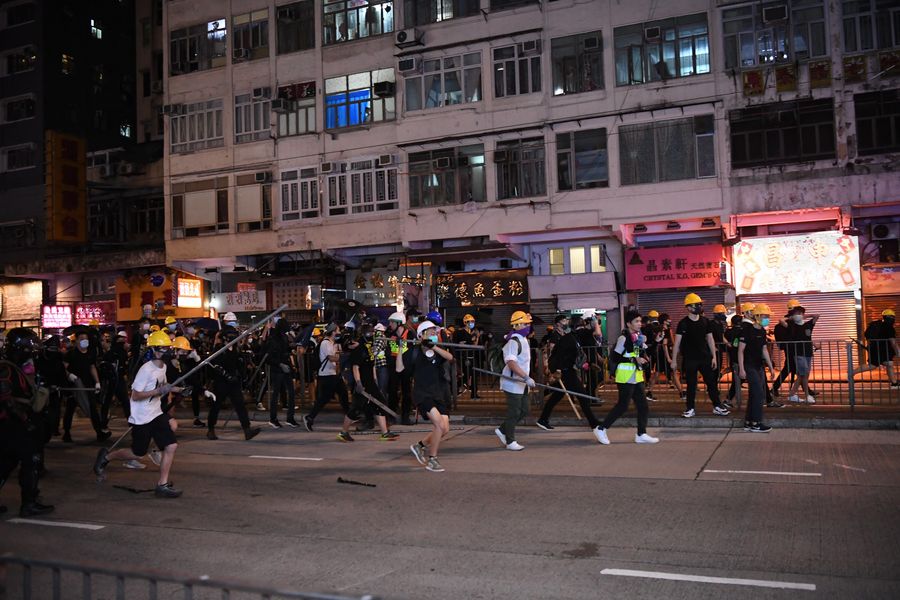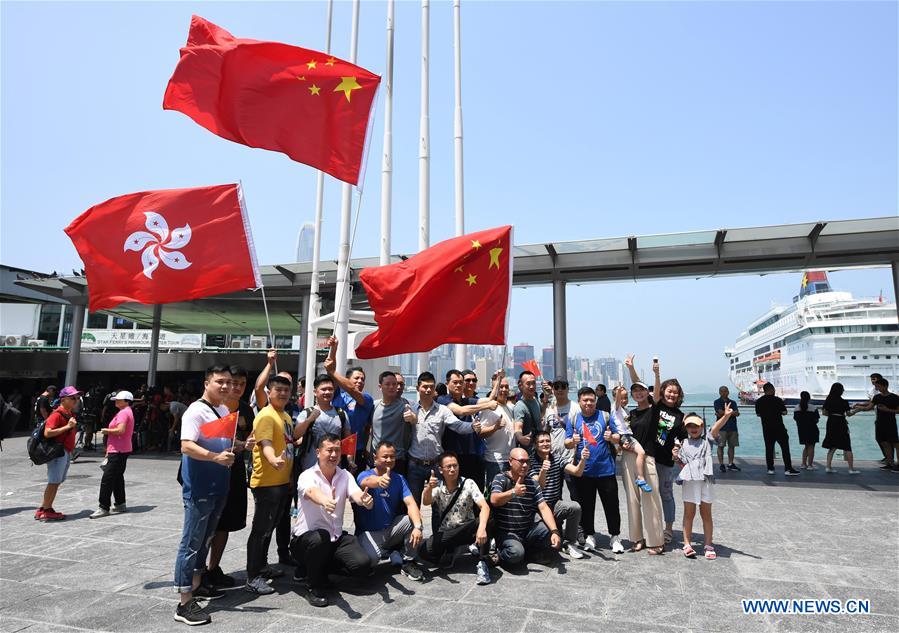Beijing on Saturday unveiled details of its proposed national security law for the Hong Kong Special Administrative Region (HKSAR), including the set up of a new commission, led by the SAR government, to safeguard state security and prevent terrorist activities.
HKSAR Chief Executive Carrie Lam immediately voiced support for the draft. We are now undertaking the necessary preparatory work, she said.
The legislature is a major measure to uphold and improve the "One Country, Two Systems," as pointed out by Li Zhanshu, China's top legislator. It is also a fundamental solution to ensure Hong Kong's long-term prosperity and stability, he said.

Violent protesters go after a police vehicle (not pictured) in North Point, Hong Kong Special Administrative Region (HKSAR), August 5, 2019. /Xinhua
Violent protesters go after a police vehicle (not pictured) in North Point, Hong Kong Special Administrative Region (HKSAR), August 5, 2019. /Xinhua
The much-anticipated draft legislation came at a time when widespread violent protests, which broke out last June, have plunged the financial hub into turmoil causing the economy to see the worst decline on record in the first quarter this year.
Read more:
Opinion: How protests are damaging Hong Kong's economy
According to a government release, the HKSAR would exercise jurisdiction over criminal cases as stipulated in the law, except "when the criminal acts jeopardize national security."
This is an important reflection of the central government's overall jurisdiction over Hong Kong, the statement said.
Another office, run directly by Beijing, will also be set up in the city to analyze the security situation, "collect intelligence" and "deal with criminal cases concerning national security in accordance with the law."
But what are the two new bureaus and how will they work?
A national security commission led by HKSAR
The structure
According to the government release, the national security commission, whose official name is yet to be announced, will make the HKSAR's chief executive responsible for preserving national security.
Others under the organizational chart include the SAR's chief secretary for administration, financial secretary, secretary for justice, secretary for security and police commissioner.
The commission will also establish the post of the National Security Adviser, a position to be appointed by Beijing, and dedicated units within the Hong Kong Police Force and the Department of Justice. Both will take on huge roles in implementing the relevant enforcement work.
Responsibilities
Officials selected for the group are obligated to analyze and appraise national security situation in the HKSAR and push for the construction of relevant legal system and operating mechanism.
Types of crimes
The draft law makes clear four types of activities that constitute crimes threatening national security - secession, subversion of state power, terrorist activities and collusion with foreign or external forces to endanger national security - and the corresponding penalties.
The provisions of the law shall prevail when HKSAR's local laws are inconsistent with this law, according to the draft.
National security office to be set up by Beijing
Responsibilities
The office will analyze and appraise the national security situation in the HKSAR and provide comments and suggestions for major strategies and policies in this regard, as per the law.
The office is required to supervise, guide and coordinate with and support the HKSAR in performing its duties on safeguarding national security.
It shall also collect and analyze intelligence information concerning national security and deal with criminal cases concerning national security in accordance with the law.
If the law gets passed, the national security office would be the fourth bureau dispatched to the HKSAR by the central government.
The three others were set up in 1997 when China resumed sovereignty over Hong Kong – namely, the Liaison Office of the Central People's Government, Office of the Commissioner of the Ministry of Foreign Affairs in Hong Kong and the People's Liberation Army Garrison in Hong Kong.
When will the draft law be approved?
On Saturday, China"s top legislative body, the National People's Congress Standing Committee, concluded its three-day session after first deliberating the draft law. So far, it is still under review at the country's top legislature.
Tan Yaozong, a deputy to the National People's Congress, told Global Times that the draft has absorbed suggestions and opinions from the HKSAR government and people from all walks of life. Based on official records, over 130 suggestions were collected.

People wave the Chinese national flag and the flag of the Hong Kong Special Administrative Region (HKSAR) at a pier in Tsim Sha Tsui of Hong Kong, south China, August 8, 2019. /Xinhua
People wave the Chinese national flag and the flag of the Hong Kong Special Administrative Region (HKSAR) at a pier in Tsim Sha Tsui of Hong Kong, south China, August 8, 2019. /Xinhua
Experts suggest that the central government will speed up the legislative process in the upcoming days.
The legislation needs to be complete and take action as fast as possible to deter further foreign interference in Hong Kong issues, Tian Feilong, member of the Beijing-based Chinese Association of Hong Kong and Macao Studies, told the Global Times.
Supervising Adviser of Hong Kong Federation of Women, Annie Wu Suk-Ching, echoed Tian's sentiments, also calling for the job done "the sooner, the better."